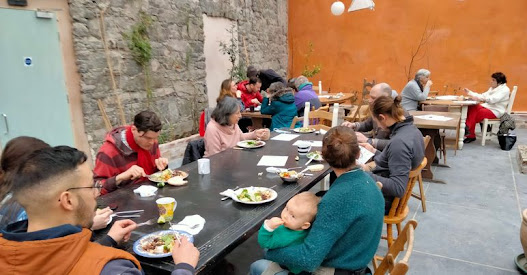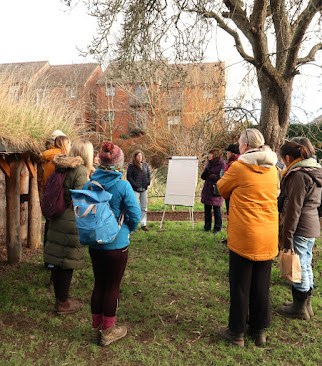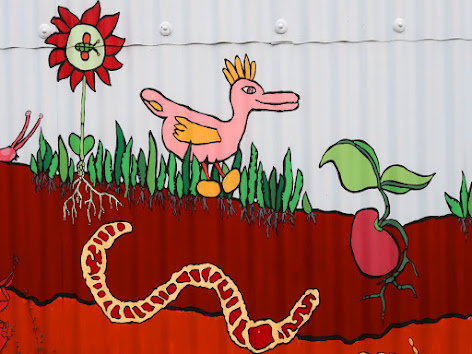We were really excited to meet for the first time face-to-face (outdoors) at the very end of January to share good practice, encourage debate, and inspire organisations to grow their own community food projects. These will be operating at the very heart of their own individual Powys communities.
The meeting took place at cooperative Cultivate’s thriving base in Newtown in North Powys and was attended by a number of the groups making up the network currently, including Incredible Edible Llandrindod, the Hanging Gardens Project in Llanidloes (part of The Wilderness Trust), Play Radnor and Presteigne & Norton Allotments’ Association.
In this blog post we look at the many benefits that Growing Cooking & Sharing food have for people and their communities, not just for people’s mental health but for wellbeing in general.
Basically, it’s all about bringing people together through food.
Food for Life Get Togethers are regular community activities that connect people of different ages and backgrounds through growing, cooking and sharing good food.
Our new network in Powys is all about encouraging groups and communities to get involved in growing, cooking and sharing activities and hopefully setting up their own FFL Get Togethers. Bringing groups together helps groups share good practice and top tips for successful community work in this field.
At this our second network meeting (the first was online last November) Jodie, the Manager at Cultivate, showed us some of the amazing work this thriving cooperative is already doing in North Powys. We will look at this in more detail below. Other organisations then contributed information about their own projects and aims for the future.
According to the Food for Life Get Togethers’ website the benefits of coming together over good food can be particularly beneficial because:
- Younger people are becoming more disconnected with where their food comes from.
- There aren’t many opportunities for older and younger people to bond.
- Many people – of all ages – feel isolated within their communities and do not know their neighbours.
- We are feeling increasingly divided as a nation. The BBC’s Global Survey reported that 85% of people surveyed think the UK is very or fairly divided.
Gardening, especially to grow food, has many proven benefits for people. It takes us outdoors and into Nature, which just in itself can have massive benefits on mental health. This is perhaps why garden volunteering, ecotherapy and Green Minds projects connected to voluntary sector mental health services have flourished in recent years.
Other positive outcomes can include learning new skills, meeting new people and making friends in the local community, physical exercise and the sheer utter delight of nurturing a garden and seeing it thrive through the seasons. And on top of all that we can add in - the ability to grow tasty fresh food - locally (fewer food miles) and more cheaply too! What’s not to like!?
At Cultivate’s 2.5 acre site next to Theatr Hafren in Newtown there are micro allotments for amateur gardeners alongside larger plots used by community groups. Local people enjoy the communal spaces - the fire pit, round house, BBQ, open lawn areas and wildlife pond. They are inspired to take vegetable growing and food production home with them.
Cultivate are currently running weekly garden volunteering sessions to teach their volunteers to prepare simple, tasty and affordable vegetarian meals to share with their fellow volunteers, family and the wider community.
Cultivate staff and volunteers are passionate about making local food more accessible. They have horticultural demonstration and research growing areas, and one of their key aims is to: ‘Assist and empower others to establish fledgling enterprises of their own’.
Presteigne & Norton Allotments’ Association
Presteigne and Norton community allotments in Lower Went’s Meadow were opened in March 2010 and have provided a place to grow locally since then. To start the 2022 season they are hosting a seed swap and coffee morning, where they will also launch a potato in a bucket and sunflower competitions. This will be followed by a plant swap in May.
Studies on allotment growing, including Sheffield University’s “My little piece of the planet”, revealed the following benefits for allotment gardeners: “high levels of social and community activities including the sharing of surplus food produce, knowledge exchange, awareness and interaction with wildlife, emotional connection to their allotment, appreciation of time spent outside and aesthetic delight in the natural world around them.”
Cook
What we eat has a big impact on our mental health. Freshly cooked meals, using homegrown or locally sourced vegetables and fruit, can provide so many of the nutrients we need without being overloaded with sugar and fat. As cooks we have control over the ingredients. Plus the meals taste so much better!
Cooking is definitely a skill to be acquired though - but well worth the learning. We can feel a real sense of accomplishment at trying new recipes, and cooking together with friends and family is very rewarding. Just the very act of preparing food can be therapeutic. So all in all definitely a way to improve mental health and physical wellbeing - and to eat well of course.
Incredible Edible Llandrindod
Growing as much food locally in the town of Llandrindod is the main aim of this group. Last year was a great success with brand new raised beds on an old tennis court seeing dozens of successful crops available for locals to harvest. The group is now hoping to provide cookery sessions at the community led sustainability hub called The Hive in the centre of town. Llandrindod Seed Library is also based here.
Play Radnor
At the Play Hub run by children’s charity Play Radnor in Llandrindod Wells there are also plans to set up cookery sessions - these will be aimed specifically at families and children.
Share
Sharing, by its very nature, brings people together, especially sharing food. Eating together, as family, friends or community, is one of the best ways to address loneliness and isolation. It encourages intergenerational mixing, and gives an opportunity for people to have fun together, to share stories, laugh, build trust, and to open up and talk about any difficulties they may be experiencing in life if that is appropriate. Chatting over a meal can be so much less intimidating than just meeting to talk.
 |
| Community meal at The Hanging Gardens, Llanidloes |
The Hanging Gardens project in Llanidloes is using a small grant from the Winter Pressures fund administered by PAVO to set up free cookery demonstrations and provide community meals for local residents whilst at the same time addressing the issue of food waste. You can also join cookery workshops to learn three recipes in an afternoon, and take these home along with some ingredients. It’s a chance “to meet new people and shake off the winter blues.”
The next meeting of the Powys Food for Life Network is actually being held at The Hanging Gardens in Llanidloes. The date is still to be confirmed, but it you would like to find out more and sign up to the network please contact Sue Newham by emailing sue.newham@pavo.org.uk






































